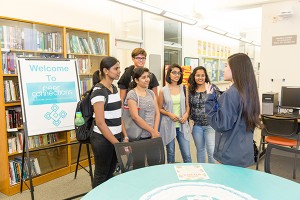
Photo: David Schmitz
Students visit Peer Connections location in the Student Services Center during an open house event in September. The program offers mentors and tutors.
During a Monday afternoon just before finals week, SJSU’s Peer Connections mentors and tutors were gathered at small tables in the Student Services Center, ready to help other students with last-minute study support. Sana Rahim, a third-year business marketing major, and Fatema Elbakoury, a fourth-year English major, were waiting for drop-in appointments.
“I like working with students, especially returning students,” said Rahim, a tutor. “We build relationships with them and see their growth throughout the semester.”
“It’s a cool community,” said Elbakoury, who completed the Humanities Honors program and now mentors other students in the program. “We have staff meetings to get to know everyone.”
Blake Lonero, a senior psychology student, learned about Peer Connections through his own mentor as a freshman. The program provides mentors and tutoring services to Spartan students at three locations on campus – the Student Services Center, Clark Hall and Living Learning Center in Campus Village B.
“I wanted to get involved with Peer Connections because I ultimately want to become a teacher and knew that I would be able to gain valuable experience,” Lonero said.
The best part of having a mentor for other students is the emotional and academic support they provide, he said. His favorite part of mentoring other students is when he can persuade them to try out a resource on campus that will help them.
“Peer Connections is a valuable asset to ease the experience of being a student and I hope that everyone takes advantage of the services that we offer,” Lonero said.
Rahimeh Ramezany, a communication studies graduate student specializing in intercultural communications, said she has gained skills as a tutor that will help her in the field of education after graduation.
“We try our best to help students become more effective learners and not just with the material they come in to work on,” she said. “They walk away with study skills that will help them when they can’t come in for an appointment, and eventually, hopefully, they won’t need to come in for tutoring at all.”
Joyce Lum, a senior business administration major, said she first learned about Peer Connections from a friend who worked there.
“My favorite part of being a tutor is knowing that I have developed genuine friendships with both my coworkers and my tutees alike, some of whom I see on a weekly basis,” she said. “Rarely are there jobs where you enjoy what you do, feel like you are truly making an impact on those around you and afford the opportunity to connect with such amazing people.”
At first, Lum struggled with being a full-time student, being involved on campus and juggling two jobs, including working at Peer Connections. Her supervisor noticed and offered her guidance, teaching her that it was okay for her to seek out help, too.
“I believe what my tutees get out of our sessions is more than academic help,” she said. “They often come into our sessions feeling uncertain and stressed but leave in a much more optimistic mood. I feel as if tutors are able to instill hope into their tutees and this alone makes me love what I do.”